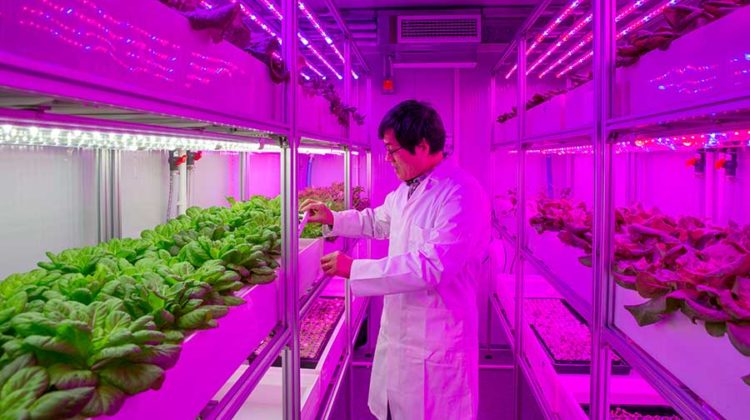
Researchers at Nottingham Trent University are designing a next-generation vertical-farming system that uses state-of-the-art hi-tech growing methods to produce bumper crops year-round in the hope of tackling future global food challenges.
The system – in which fruit and vegetable plants are stacked vertically and grown without soil – is designed to be used by retailers, caterers, local authorities and schools. Working in partnership with Henley Associates, the researchers are creating two vertical farming units – one about the size of a shipping container and the other about half the size – which will act as an initial proof of concept.
According to the researchers, the fully autonomous farming system will be capable of producing much bigger yields of crops that are more nutritious and ready to harvest in at least half the time for a fraction of the cost of conventional crops. The vertical farms will also be able to operate without the need for favourable weather, fertile soil or large volumes of water. And because the crops will be produced closer to the consumer, the costs associated with transport, both financial and environmental, will also be reduced, while shelf-life will be increased.
The crops are grown without soil in a nutrient-rich solution using an ultrasonic semi-mist culture aeroponic and hydroponic growing system. The plants’ roots are suspended mid-air in a high-humidity environment and misted intermittently with a nutrient solution. This increases the efficiency of nutrient uptake and provides the plants with a surplus of oxygen at the root surface.
The researchers are currently working to optimise the specific combinations of lighting, environmental and nutrient-mix profiles to suit the needs of specific crops. Ultimately, the systems will be powered by solar panels.
‘We are designing and engineering prototypes before carrying out a detailed feasibility study,’ said Chungui Lu, Professor of Sustainable Agriculture in NTU’s School of Animal, Rural and Environmental Sciences. ‘We urgently need to develop new methods to enable intensive and sustainable crop production. We need an innovative container farming system that can be manufactured at low cost, is easy to install, unaffected by climates and seasons, and can produce high yields with high-quality crops with a significant reduction in carbon footprint.
‘It’s also important to reduce reliance on imports, particularly given the UK’s exit from the EU. Each container is capable of producing three to five tonnes of crops a year,’ he continued. ‘Using novel semi-mist culture methods, this will be an advanced, energy-efficient and carbon-neutral vertical farm for onsite use at retailers, schools and other organisations. By the end of the project, we will have a new generation of containerised vertical farming that will improve UK resilience to environmental shocks and food security and will be beneficial for both the farming industry and society.’
The vertical farms will be created over the next two years, with one of the units based at the university’s Brackenhurst Campus and the other in Grantham, Lincolnshire. The project is being supported by almost £800,000 funding from a UK Research and Innovation Innovate UK SMART Grant.



